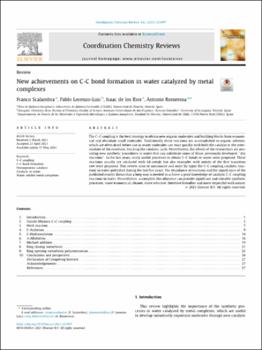New achievements on C-C bond formation in water catalyzed by metal complexes
Fecha
2021Resumen
The C–C coupling is the best strategy to obtain new organic molecules and building blocks from economical and abundant small molecules. Traditionally these reactions are accomplished in organic solvents,
which are often dried before use as water molecules can react quickly with both the catalyst or the intermediate of the reactions, blocking the catalytic cycle. Nevertheless, the efforts of the researchers are providing new synthetic procedures in water that can substitute some of those, previously developed, ‘‘dry
reactions”. In the last years, really useful processes to obtain C–C bonds in water were proposed. These
reactions usually are catalysed with 4d-metals but also examples with metals of the first transition
row were proposed. This review aims to summarize and order by types the C–C coupling catalytic reactions in water published during the last five years. The abundance of reactions and the significance of the
published results shows that a long way is needed to achieve a good knowledge of catalytic C–C coupling
reactions in water. Nevertheless, accomplish this objective can provide significant and valuable synthetic
processes, more economical, cleaner, more selective, therefore friendlier and more respectful with nature.





